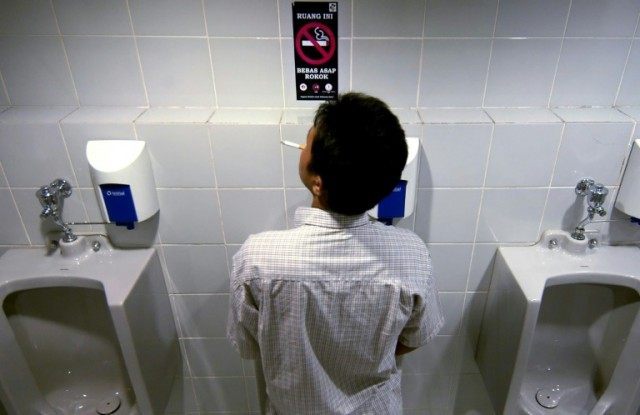A Federal Circuit court ruled today that a local Virginia school board violated the law by not allowing a girl to use the boys’ restroom.
If the convoluted decision survives, according to the judge who opposed the two-to-one decision, schools “could never meaningfully provide separate restrooms and locker rooms on the basis of sex … [and] privacy concerns would be left unaddressed.” The decision is “illogical and unworkable,” Judge Paul Niemeyer said.
In G.G. v. Gloucester Country School Board, the 2-1 court determined that the school board discriminated “on the basis of sex” in violation of Title IX.
Roughly one in every 330 Americans change their name from one sex to the other sex.
Title IX explicitly bans discrimination based on sex, but the Department of Education told the school district last year that discrimination based on the new idea of “gender identity” is the same as discrimination based on biological sex.
Specifically, the policy was imposed via an agency letter — not a regulation — in which officials say, “When a school elects to separate or treat students differently on the basis of sex … a school generally must treat transgender students consistent with their gender identity.”
The entire case hinged completely on this letter from agency officials, even though the notion of gender identity was not known to the congressional drafters of Title IX back in the 1970s.
G.G. is a young girl who announced not long ago that she is a boy and had always felt like a boy. Her parents allowed this to proceed, and the School District allowed her use a private bathroom that was also open to all other students. The girl said this caused her anxiety and she demanded use of the boys’ restroom.
The school administration relented, but parents at the school revolted and took the issue to the school board. The board determined said the girl would be required to use either the girl’s restroom or the private restroom which they had provided for her, an accommodation allowed by Title IX.
She took her case to court and lost, then appealed to the Fourth Circuit, and today she won.
The majority, led by Judge Henry Floyd, an Obama appointment, bought completely into the whole transgender ideology. He called her a “transgender boy,” and referred to her “birth-assigned sex” and her “so-called ‘biological sex.’”
“Birth-assigned sex” is one of the main arguments of the trans-ideology — that science is trumped by desire, that no one is biologically male or female, and that people can create our own “gender identity.” Some advocates of this new creationism even argue that sex should be left blank at birth so each child may more easily create their own gender identity.
Judge Floyd even took issue with parents at the school who disagreed with this transgender ideology. In his decision, he said that people at a public meeting of the school board “displayed hostility” to the girl by referring to the girl as “young lady.”
In a stinging dissent, Judge Paul Niemeyer wrote, “The majority’s opinion, for the first time ever, holds that a public high school may not provide separate restrooms and locker rooms on the basis of biological sex.” The dissent went on:
Rather, it must now allow a biological male student who identifies as female to use the girls’ restrooms and locker rooms and, likewise, must allow a biological female student who identifies as male to use the boys’ restrooms and locker rooms. This holding completely tramples on all universally accepted protections of privacy and safety that are based on the anatomical differences between the sexes.
Further, he wrote, “This unprecedented holding overrules custom, culture, and the very demands inherent in human nature for privacy and safety, which the separation of such facilities is designed to protect. More particularly, it also misconstrues the clear language of Title IX and its regulations….”
Niemeyer points out that a school receiving federal funds “may not discriminate on the basis of sex, they also specify that a school does not violate the Act by providing, on the basis of sex, separate living facilities, restrooms, locker rooms, and shower facilities.”
Niemeyer asserts that acceptance of the young lady’s definition of the term sex “would necessarily change the definition of ‘sex’ for purposes of assigning separate living facilities, locker rooms, and shower facilities as well.”
The majority opinion is “illogical and unworkable,” said Niemeyer. The new definition of sex would mean schools would obey the the agency letter by providing facilities for boys and girls whose gender identity aligned with their biological sex, but violate the Title IX law by not separating biological boys from girls.
“No restroom or locker room separation could ever be accomplished consistent with the [letter] because a transgender student’s use of a boys’ or girls’ restroom or locker room could not satisfy the conjunctive criteria,” Niemeyer writes.
Therefore, when asserting that G.G. must be allowed to use the boys’ restrooms and locker rooms as consistent with his gender identity, G.G., the government, and the majority must be arguing that ‘sex’ as used in Title IX and its regulations means only gender identity. But this construction would, in the end, mean that a school could never meaningfully provide separate restrooms and locker rooms on the basis of sex. Biological males and females whose gender identity aligned would be required to use the same restrooms and locker rooms as persons of the opposite biological sex whose gender identity did not align. With such mixed use of separate facilities, no purpose would be gained by designating a separate use ‘on the basis of sex,’ and privacy concerns would be left unaddressed.

COMMENTS
Please let us know if you're having issues with commenting.